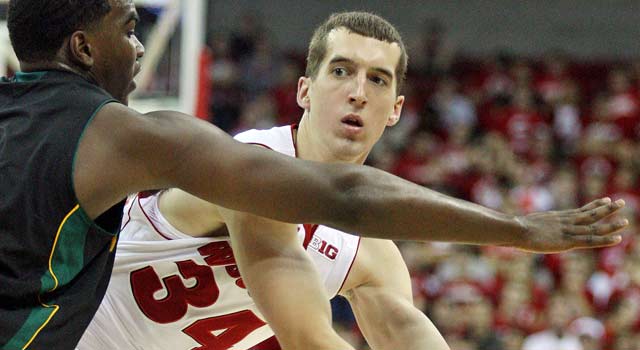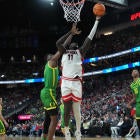 |
| Zach Bohannon's Badgers are 14-7 and 5-3 in the Big Ten standings. (US Presswire) |
By Zach Bohannon
I understand a person doesn’t get into a job for the money, although many people still do, unfortunately.
Athletic training is one of those fields, even at the highest levels, where you don’t make very much compared with the hours you put in. They are rarely compensated for the time spent with their athletes. The people who take these jobs are the ultimate givers. They care for the athletes whom they tend to and do what’s best for the health of the athlete because that’s what they were trained to do, even if they are put under extreme pressure to do otherwise and told to compromise their morals in the process.
They are not coaches. Athletic trainers are way more than that. They are allied health professionals. They don’t have to deal strictly with the physical aspect of the sport. They have to deal with the mental, emotional and spiritual aspects as well.
Not only do athletic trainers take care of all of the bumps, bruises, twists and snaps of the human physique, they deal with the ups and downs of the athletes, the questioning of one’s ability to play the game and, most importantly, they play the reassuring confidant that lets the athlete know that they are cared for always.
Ask any current or former college basketball player, and I guarantee that at some point in his (or her) career he had an athletic trainer who helped him become not only a better player on the court but a better person off it as well.
Athletic trainers are usually in a constant game of “whack-a-mole”: the moment they think they have “knocked” a problem or issue down, another problem or issue “pops” up. They constantly have to stay in a ready position because they don’t know what the next play, let alone the next day, holds.
Unfortunately, this takes a toll on not only them, but their families as well. Their families get left in the dust during the season when they travel, or when someone gets injured and they have to stay hours later than expected or come to work earlier the next day.
Ask any athlete participating in a college basketball program, and he will agree that athletic trainers for his sport are overwhelmed, underpaid and, for the most part, underappreciated. If you have coaches who say, “He should be the highest-paid trainer in the conference,” actions should be made to make it so.
Unfortunately, one of the problems with college basketball is giant sums of money continue to be brought into the system, so coaches are demanding more and more control over their own staffs. Newly hired head coaches want to hire not only their own strength and conditioning coaches, but many are asking to hire their own athletic trainers as well.
In addition, if they are not happy with the current athletic trainer they have, most coaches now have the authority to “fire” their trainers. Don’t be fooled when you hear athletic departments say that a trainer is being “reassigned,” “stepping down” or “exploring other options” because most of the time the head coach had the final say in their job. In a recent “retirement,” one athletic director commented that we “wish him nothing but the best, while knowing he will never be replaced.”
If you’re going to use words that strong as an athletic director of a big institution, why would you let a coach make the decision for the athletic trainer to retire? Should this be a decision for the sports medicine staff only?
This is why I believe it is time for a change. Athletic trainers need more security and perhaps a raise to compensate for their dedication to the athlete, team and institution. Currently, their profession’s salary is generally half the salary of the third assistant on a Division I bench. That hardly seems fair, does it?
One big reason why this issue hasn’t been discussed is that athletic trainers don’t complain. They come in, do their job to the best of their ability and agonize during their off hours as to how their athletes are doing.
Athletic trainers don’t have hidden agendas. They are concerned with only one thing: the well-being of the athlete. It is time for others to see these great people in a new light. Words and praise alone don’t do them enough justice, although many athletic trainers live for these kind words.
Furthermore, I highly recommend whenever you see your school’s athletic trainer to echo a few simple words that include, “Thank you. I appreciate all that you do for us!” Trust me, these words alone will go a long way for those extraordinary people.
However, it is time for college coaches and athletic directors to take that next step, give them a much needed raise and show them the appreciation, individually and as a profession, that they deserve. It will be a tragedy if anyone hears an athletic trainer, like I have recently in my life, who said, “I have finally realized there is life outside of college basketball and athletics, and it is time for me to move on.”
If it wasn’t for these dedicated people, college basketball would not be what it is. They keep the ball bouncing, literally, by keeping bodies healthy and on the court. They are the “tape” that intertwines college basketball players into a team. It is now time for them to be shown the support that they rightfully deserve.




















